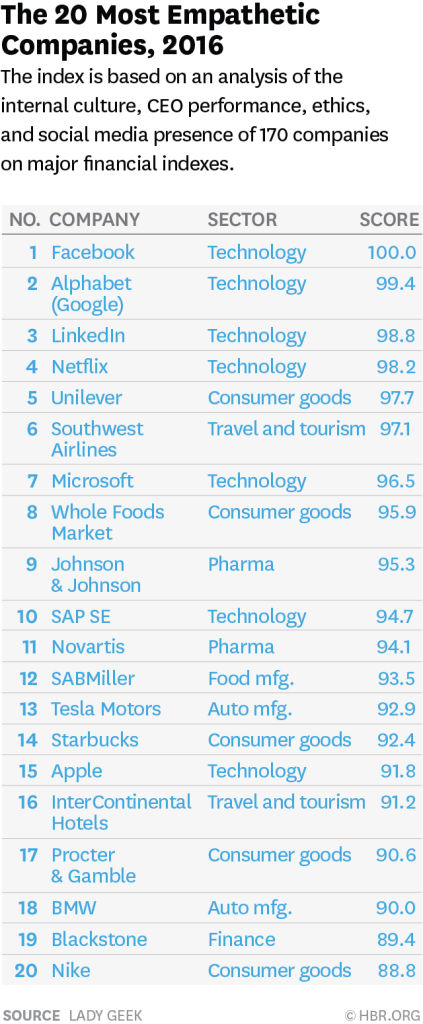If you’ve heard me speak on “Humanity Means Business,” you know I pay a lot of attention to the intersection of corporate culture, business performance, and people. And I mention several organizations that measure and/or rank employers on scales of relevant cultural attributes.
It is sometimes surprising to audiences that top ranked (on a number of lists) employers are also top financial performers. So lists like “FORTUNE’s 100 Best Companies to Work For,” and WorldBlu’s annual list of certified employers, along with BCorp certified companies and devotees of the Conscious Capitalism movement – all provide road maps for leaders to enhance corporate performance through creating strong, human (of varying sorts) relationships with their people. And it’s always interesting to me that many organizations show up on more than one list.
Through my Facebook feed, I found a different list posted on Harvard Business Review Online back in December: “The 20 Most Empathetic Companies, 2016.” This “corporate Fitbit for empathy” is about “understanding our emotional impact on others and making change as a result.” The article says empathy “is more important to a successful business than it has ever been, correlating to growth, productivity, and earnings per employee.” While the article’s author, Belinda Parmar, the founder and leader of the company behind the “Empathy Index,” doesn’t share those correlations, she does share the 2016 list. And the listed companies do not surprise; they show up on other lists.
Based on this list, I’ll easily believe that they all have better than average retention statistics, and certainly strong records of financial performance. But I wonder if each company on the list is truly an organization “where diverse teams thrive.” One just needs to note the number of Silicon Valley tech companies. We all recognize the diversity challenges these organizations face – including those on this list.
The article’s author says,“The tech sector continues to lead our ranking, now accounting for an even bigger share of our top ten (60% in 2016 versus 50% in 2015), with Facebook knocking Microsoft off the top spot, owing to its focus on improving its internal culture and the introduction of the Empathy Lab.” So trying counts. But should it?
Here’s how the Empathy Index is described:
“The Empathy Index seeks to answer the question: Which companies are successfully creating empathetic cultures? These are the companies that retain the best people, create environments where diverse teams thrive, and ultimately reap the greatest financial rewards.”
I wonder at the assumptions being made by the researchers. These are their research parameters:
- Ethics
- Leadership
- Company culture
- Brand perception
- Public messaging through social media
- CEO approval ratings from staff
- Ratio of women on boards
- Number of accounting infractions and scandals
- A carbon metric was added in 2016
That’s a lot. They don’t say how they measure these components, just that many are from public sources. Counting the number of women on boards is easy. Measuring ethics and culture are not. Defining and measuring brand perception is doable, measuring leadership is not.
I think we’d all agree that empathy is a good thing – for people and organizations. I’m really not sure, however, that empathy – as a leading organizational culture characteristic – is that meaningful. Are these 20 companies on this list because they’re trying to be empathetic? Or are they on the list because they pay people fairly and well; have intelligent, approachable leaders; are competitive in their sectors and have business plans that take advantage of – and lead – their market conditions? I’m not sure we can tell.
I’m not convinced that empathy as a corporate culture cornerstone is something that moves the performance needle more than respect, intelligence, humanity and flexibility – or any other list of current cultural attributes. It’s an interesting discussion, though, and I encourage you to read the HBR online article. It will definitely get you thinking.
This originally appeared on China Gorman’s blog at ChinaGorman.com.
